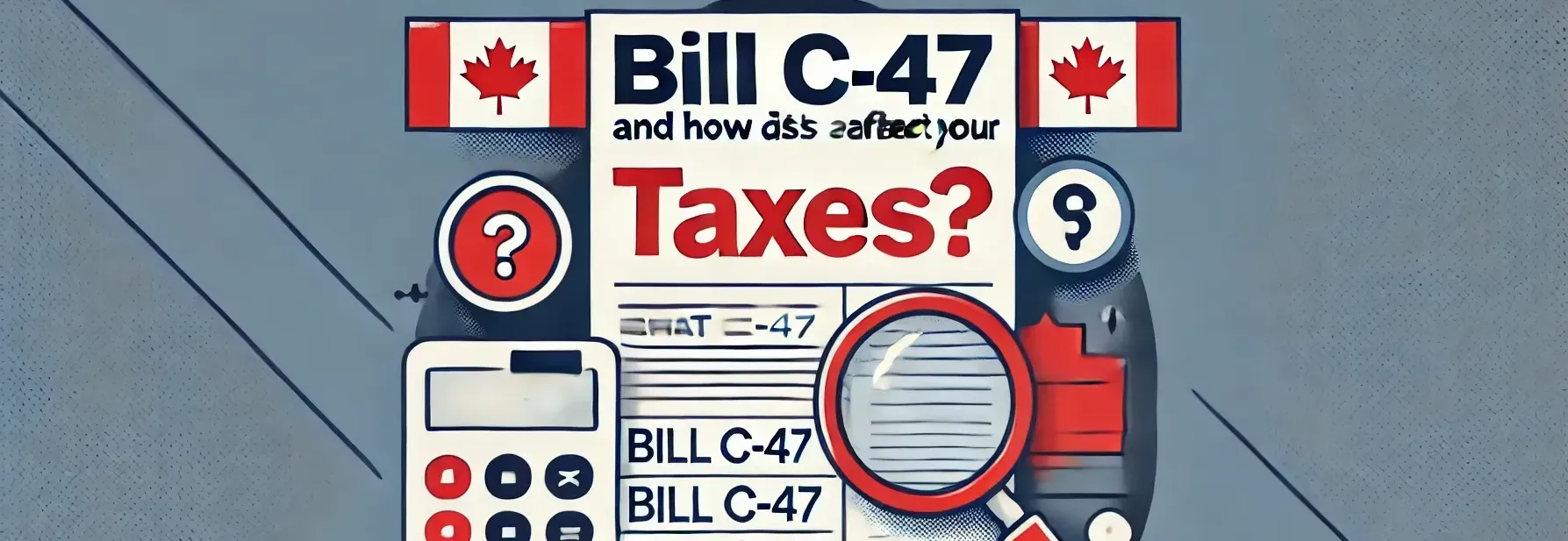What is Bill C-47 and How Does It Affect Your Taxes?
If you’re a gig worker, whether you drive for Uber, write blogs, or work in any other freelance capacity, being your own boss gives you the freedom to control your work schedule. However, it also means you need to stay on top of your tax obligations. Recently, new legislation called Bill C-47 came into effect, introducing changes to how platform operators—like the websites or apps you use—report your earnings to the Canada Revenue Agency (CRA).
Let’s dive into what Bill C-47 entails and how it may affect your taxes as a gig economy worker.

What is Canada’s Income Tax Act?
The Canada Income Tax Act governs all laws related to taxation in Canada. It outlines what income is taxable, eligible deductions, and penalties for noncompliance. Bill C-47 introduces amendments to the Income Tax Act, specifically around mandatory disclosure rules, ensuring the CRA has more visibility into gig workers' earnings and tax reporting by platform operators.
What is Bill C-47?
Bill C-47 is a legislative update that impacts platform operators, like Uber, Lyft, Airbnb, Etsy, and Amazon, by requiring them to report information about their users (sellers or service providers) to the CRA. It aims to ensure that gig workers' earnings are accurately reported and taxed.
When Did Bill C-47 Come Into Effect?
Though in planning for several years, Bill C-47 was officially introduced in the 2023 federal budget and is in effect as of January 1, 2024.
Key Measures of Bill C-47
New Reporting Requirements for Platform Operators
Under Bill C-47, platform operators must report:
- Identifying information about their business (name, registered office, tax identification number).
- Information about sellers using the platform, including:
- Full name
- Date of birth
- Primary address
- Tax Identification Number (TIN): For most Canadian gig workers, this is their Social Insurance Number (SIN).
Reporting Sellers’ Income
Platform operators must report both their financial transactions and the revenue earned by gig workers. This helps the CRA track income that might otherwise go unreported. Operators must also provide sellers with a copy of the information sent to the CRA.
Reporting Deadline for Platform Operators
Platform operators are required to file an information return with the CRA by January 31 of the year following the year a seller is identified as reportable.
Penalties for Noncompliance
Failure to comply with the new rules could result in significant CRA penalties, so platform operators need to ensure they meet these reporting obligations.
Bill C-47 and Tax Administration Changes
Bill C-47 brings several changes to how taxpayers interact with the CRA, with an increasing focus on electronic services:
- Electronic Payments: Payments to the CRA over $10,000 must be made electronically, with a penalty of $100 for each non-compliant transaction.
- Electronic Filing for T4 Slips: If you’re filing 5 or more T4 slips, they must be submitted electronically. Noncompliance can result in fines ranging from $125 to $2,500, depending on the number of slips.
- Electronic Signatures: You can now use electronic signatures for Form T183 (allowing your tax filer to submit your tax return electronically) and Form T2200 (certifying that you incurred employment expenses).
Impact on GST/HST
If you're a ride-share driver or if your income meets the threshold for GST/HST registration, Bill C-47 ensures that services provided by payment card network operators continue to be subject to GST/HST. Essentially, there are no major changes here for gig workers in terms of remitting GST/HST.
Keep Meticulous Records
To avoid any discrepancies between what platform operators report and your own records, be sure to:
- Track your income carefully.
- Keep detailed records of your expenses (e.g., gas, maintenance, phone usage for Uber drivers).
- Regularly review the information platform operators send to the CRA.
By staying informed about Bill C-47 and keeping accurate records, you can ensure you meet your tax obligations and avoid any surprises come tax season.
Key Takeaways
- Bill C-47 introduces expanded legislation mandating that platform operators collect and report identifying information about sellers using their platforms, including their income.
- Noncompliance with Bill C-47 may result in significant financial penalties.
- The bill also brings several administrative changes, requiring taxpayers to use the CRA’s electronic services rather than submitting information manually.











